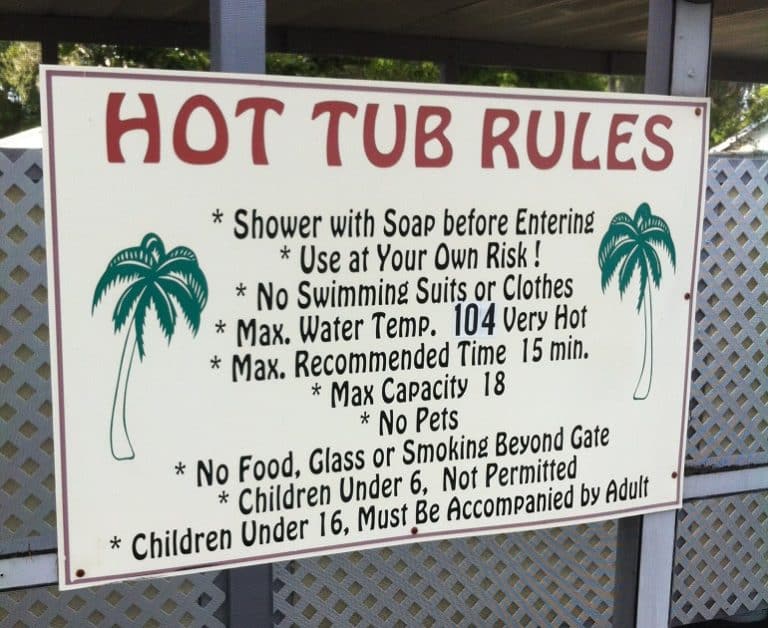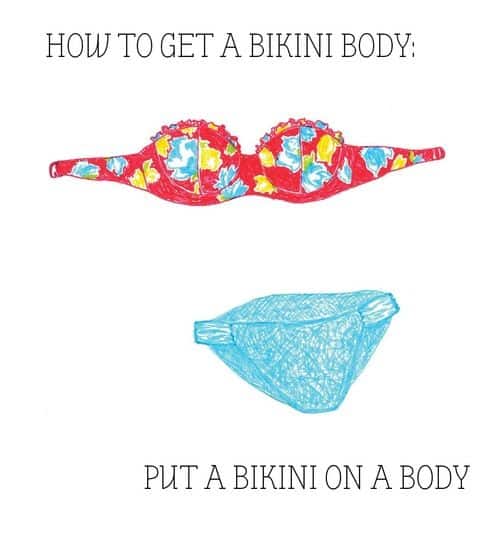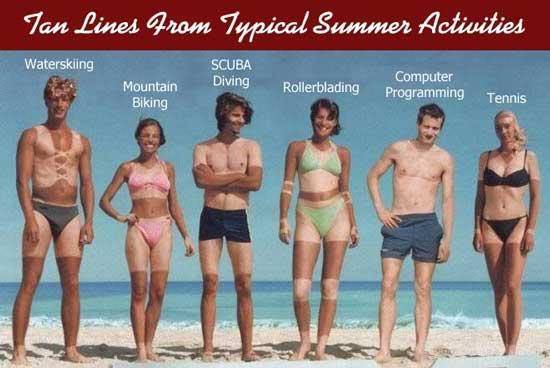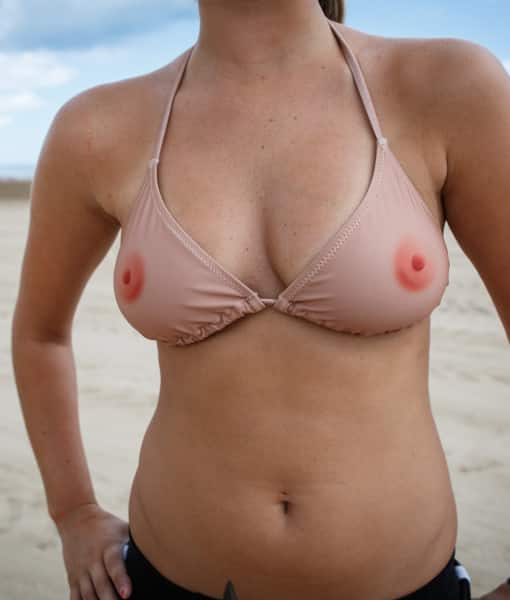Why Nude Bathing Is Better Than Bathing Suits
by
Why Society Is Better Off Swimming Nude Without Bathing Suits
I’m not one of those nudies that feels compelled to be naked 24 / 7, and I would say that many nudists can’t be and don’t care to be naked everywhere, all the time. (I’ve mentioned this before in the common myths about nudism.)
I’m quite comfortable wearing clothes in the winter. I get cold very easily and am grateful for the sweaters I have to keep me warm. Though I’m not much into fashion or clothes shopping, I do like dressing up sometimes and expressing myself with certain colors, fabrics and styles.
However…there is one item of clothing that I prefer to keep buried and forgotten in my dresser: my bathing suit.
The bathing suit is one of the most useless articles of clothing ever invented by humanity. It doesn’t help you bathe or swim. Its only purpose is to cover up the body parts that American culture (and other cultures) has deemed obscene: butts, genitals and FEMALE nipples.
In the U.S., the general consensus seems to be: remove bathing suits and all hell will break loose. The beach will become overrun with public sex and perverts. This comes from our society’s gymnophobia (fear of nudity) and the idea that nudity = sex.
The fact is, we can do just as well as without bathing suits, if not better. Swimming nude used to be the norm in ancient Greek culture. Nude spas have been around for centuries. In America, nude swimming was mandatory and considered the norm at YMCA’s and in schools up until the 1970’s. Many of today’s nude beaches have been around for decades, proving that all kinds of people can indeed swim and sunbathe naked together with civility and respect. Acts of public sex are illegal at a nude beach just like anywhere else.
Though the bathing suit has gradually shrunk down from full-length costumes to today’s teeny bikini, the practices of skinny-dipping and nude sunbathing have never disappeared. The liberating feeling of swimming without a suit is a common reason people get into nudism.

Sure, people can wear swimsuits as a form of self-expression. There are all sorts of swimsuit designs out there. But I would argue that the discomfort, inconvenience and cost far outweigh any joy you might feel from wearing a stylish suit that fits.
Here’s why I think we’d all be better off without bathing suits:
1. They’re uncomfortable, tight and restricting before you even go in the water. Then you swim and get it wet… now you have cold, sopping wet fabric clinging to your skin. If you were swimming in the ocean or at a sandy beach, you’ve probably got some sand in your crotch, too. You get out of the water, and now the rest of your naturally-water-repellant skin dries while the suit stays wet for at least the next 15 – 30 minutes. For women who sit in wet bottoms, this can be the ideal breeding ground for a yeast infection. That should be a pretty big clue that we’re not meant to be wearing these things.
2. They’re unhygienic and unsanitary. Swimsuit fabrics trap detergents, perspiration, dirt, fecal matter and bacteria and then carry all that right into the public pool. This can lead to the spread of Recreational Water Illnesses (RWI’s). This is why it’s important to shower before entering a pool. But how many people actually shower first at American public pools? According to 2012 survey by the Water Quality and Health Council, only 32% of American adults said they always shower first, and many Americans — 44% — don’t even think a pre-swim shower is necessary.
And due to America’s weird hang-ups about nudity, how many of that 32% are showering in their swimsuits and still entering the pool with germs attached? We probably have the dirtiest public pools of any developed country.
Ever swim in a pool with a strong chlorine smell? That’s not an indicator of a clean pool. In fact it’s a result of impurities from people’s bodies mixing with chlorine in the water. This creates chloramines, which give off that irritating odor.
Needless to say, the preemptive shower is much easier and more effective when done naked. And any bacteria, fecal matter, sweat, germs, etc., that get trapped in suits could be avoided altogether if everyone swam nude. When kids were required to swim naked at the Y, hygiene was the primary reason given, and it’s still a good reason. Though we now have better chemical technology, chlorine is not some miracle pool cleaner.

The cleanest pools in America can probably be found at nudist resorts. No one is bringing in impurities from their clothing, and resort pools often have multiple signs instructing people to shower before entering. And if you don’t, a club member is likely to remind you because they want a clean pool.
3. Bathing suit shopping. As if anyone needed proof, Australian psychologist Marika Tiggemann’s 2012 study on body image and swimsuits found that women get anxious and depressed just thinking about swimsuit shopping. Most people seem to approach it with as much anticipation as a trip to the dentist, and with good reason. Every spring, we’re surrounded by ads about how to obtain the perfect “bikini body,” eg thin, tanned and toned with no cellulite, wrinkles or imperfections. It’s a message that only one type of body belongs in a bikini or any kind of revealing swimsuit. Some body-positive campaigns have been trying to challenge this in recent years with memes saying that bikinis are for everyone. However the bikini-body magazine stories, workouts and products will continue to sell as long as a profit can be made of course.

But even when you can ignore all the body-shaming media and advertising, you’re still faced with the task of finding a swimsuit that fits well. For “plus-size” women and women with large breasts, it’s like trying to find a needle in a haystack. When you do find your holy grail of a suit, you’re lucky if it doesn’t come with a hefty price tag.
Here’s a tweet that sort of sums my feelings: “It’s pretty annoying that I have to pay like $120 for a swimsuit, like you literally are a piece of cloth that covers my nipples.”
This isn’t to say that men are exempt from any pressure to look slim and muscular in their swim attire because they definitely aren’t. Many guys certainly do experience body image issues come beach season and in general. Society needs to do more to acknowledge and address this.
How much of a relief would it be to skip the whole process of swimsuit shopping and go to a nude beach or nude pool instead?
Plus, the “unsanitary” factor applies here as well – those new swimsuits at the store are covered in all kinds of nasty bacteria!
4. SexXy double standards. The swimsuit industry is all about sexually objectifying women. A lot of swimsuits are made to emphasize a woman’s cleavage and butt. The over-sexualization of breasts is part of the reason we’re forced to wear tops at all. Victoria’s Secret adds the word “sexy” into the names of every single one of their bathing suits. This is, again, about “bikini body” standards, but it sends the message that women are supposed to wear bikinis so they can look “sexy” and attract the (heterosexual) male gaze. Why else would we go to the beach, right? Of course people want to look and feel good in what they wear. But women are just people who want to enjoy the beach like everyone else in a bathing suit that hopefully fits right and feels comfortable (if we have to wear one).
It sounds counter-intuitive, but nude beaches and nudist resorts create a more equal and less sexual environment because everyone is naked.
As for men, I know some guys wish that America would embrace the speedo already. But be happy you can legally wear one, dudes. If I showed up at the beach or pool in a speedo, I’d very quickly be arrested or shown the door in most places. It’s been 80+ years since men won the right to be topfree in public, and women are still waiting for the same right (in most states / cities).

5. Bikini tops fall off in the water or at the water park, and then everyone stares at you as you try to discretely tie or re-clasp your top back on. Many have those annoying pad inserts, too, that get scrunched up or have to be wiggled back into place all the time.
6. Tan lines. They’re unsightly and avoidable.

As the swimsuit has shrunk in appearance, one would hope that we are eventually going to do away with it entirely or at least get more top-optional / swimsuit-optional places.
For those who do need a new bikini, maybe consider getting one that makes a statement like the TaTa Top?

This article originally appeared in felicitysblog.com in 2015 and has been updated on 11th June 2018.
Great article 👍
Swim suits are also dangerous. They result in thousands of attendances at emergency rooms each year. Swimming nude does not completely prevent sea bathers eruption but it comes close.
Speedos are very common in Australia for men for pool lap swimming, less common as beach/poolside leisurewear (in which case you’d wear board shorts).
As for nude beaches (I probably only go to my reasonably local one once or twice per summer at most) men are, of course, completely naked but women will often wear a G-string/thong type bikini bottom. I’ve heard plenty of men comment that they prefer women to keep their genitalia covered. That is, is perfectly fine for women to bare their breasts or bum but not their vulvas. So, when lying on her front (with her legs together), a woman will untie her bikini bottom to expose her buttocks — no issues — but when lying on her back (especially if her legs are splayed) a woman is subtly encouraged to wear the bottom half of a bikini, thong, G-string, etc.